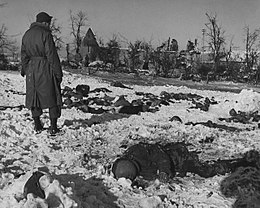
War crime
Individual act constituting a violation of the laws of war / From Wikipedia, the free encyclopedia
Dear Wikiwand AI, let's keep it short by simply answering these key questions:
Can you list the top facts and stats about War crime?
Summarize this article for a 10 years old
A war crime is a violation of the laws of war that gives rise to individual criminal responsibility for actions by combatants in action, such as intentionally killing civilians or intentionally killing prisoners of war, torture, taking hostages, unnecessarily destroying civilian property, deception by perfidy, wartime sexual violence, pillaging, and for any individual that is part of the command structure who orders any attempt to committing mass killings including genocide or ethnic cleansing, the granting of no quarter despite surrender, the conscription of children in the military and flouting the legal distinctions of proportionality and military necessity.[1]

| Part of a series on |
| War |
|---|
|
The formal concept of war crimes emerged from the codification of the customary international law that applied to warfare between sovereign states, such as the Lieber Code (1863) of the Union Army in the American Civil War and the Hague Conventions of 1899 and 1907 for international war.[1] In the aftermath of the Second World War, the war-crime trials of the leaders of the Axis powers established the Nuremberg principles of law, such as that international criminal law defines what is a war crime. In 1949, the Geneva Conventions legally defined new war crimes and established that states could exercise universal jurisdiction over war criminals.[1] In the late 20th century and early 21st century, international courts extrapolated and defined additional categories of war crimes applicable to a civil war.[1]